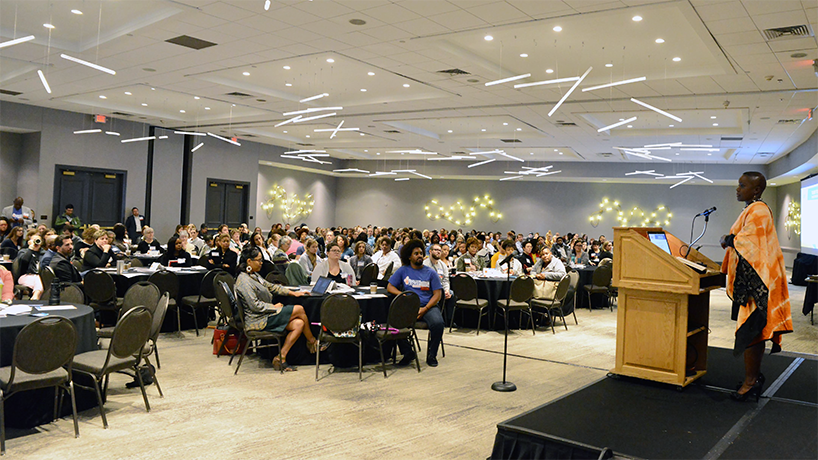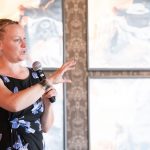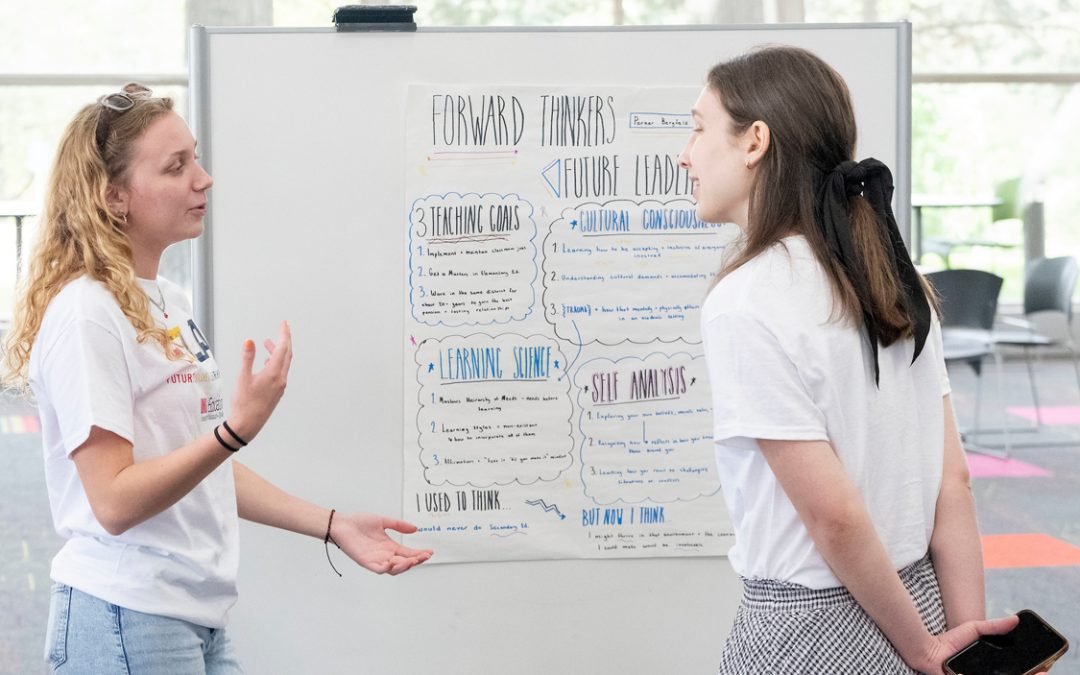
Rebeccah Bennett (at right), founder and principal of Emerging Wisdom LLC, speaks at the inaugural St. Louis Racial Equity Summit, which drew over 500 community members in 2019. The second iteration, a virtual event held August 4-6 this year, brought in over 1,000 registrants and was sponsored, in part, by the University of Missouri–St. Louis. (Photo courtesy of FOCUS St. Louis)
When the St. Louis Racial Equity Summit debuted 2019, it drew over 500 community members, which was a huge feat for the inaugural effort. But that was just the start – the second iteration, a virtual event held August 4-6, brought in over 1,000 registrants.
The key, says Wally Siewert of FOCUS St. Louis, a civic leadership organization, was being “radically community engaged.”
The summit’s planning committee drew heavily on community, and community members proposed the potential topics and ultimately chose the speakers.
“The first summit was a landmark event in terms of bringing together everybody that’s working in the racial equity area,” said Siewert, who is the director of civic engagement for FOCUS. “Like anything in St. Louis, racial equity work is divided into many different silos, and then many different spaces and many different people, many different theories, many different attitudes, many different ideas of what change should look like and how we get there. This is meant to bring the community together to figure out what it is we all share and how we can work on that moving forward.”
He sat on the planning committee to represent a partnership between FOCUS and the University of Missouri–St. Louis that started in 2018 as the Public Ethics Partnership that organized the UMSL-funded Public Ethics Conference.
In 2020, the university and FOCUS decided to commit the $10,000 in funding to the Racial Equity Summit instead to serve as seed money toward preparation efforts that have helped the summit expand its reach.
Siewert and fellow planning committee member LadyAshley Gregory, director of community partnerships for Forward Through Ferguson, a regional antiracist policy advocacy nonprofit, note how critical it is for institutions such as UMSL to be involved with racial equity efforts such as the summit.
“I think having this message and being a part of this movement, which is continuing, is crucial,” Gregory said. “We see how desperately change is needed, and we need voices to say, ‘We are here for you, and we support you, and you’re not being ignored.’ I think that’s part of what community partnerships like this do.”
Furthermore, UMSL’s mission as an anchor institution is to bring positive change as a neighbor and community partner.
“UMSL is educating people that are connected in these communities,” Siewert said, noting the university’s physical proximity to Ferguson, Missouri, which was the site of the killing of Michael Brown. “UMSL graduates are from here, they stay here, they create our community. It’s one of the most accessible education spaces in the city. Owning that, I think, is a big piece of the puzzle.”
Siewert believes the summit, and events and conversations like it, are especially important because with St. Louis’ central location, it experiences a lot of the problems that plague the nearby regions of the country.
St. Louis is also where a wave of resistance started after Brown’s death. That can be seen in the evolution in leadership with the elections of Rep. Cori Bush, St. Louis City Mayor Tishaura Jones, St. Louis County Prosecutor Wesley Bell and others.
The first step to creating positive change is to discuss the problem, and events such as the summit are key.
“We’re not going to fix the problem by not talking about it, not understanding, not feeling and not coming together collectively,” Gregory said. “I know that once the folks who are most proportionally affected by racism and systemic oppression are thriving, we will all thrive. This is a collective fight, a collective effort.”
This year’s summit was held virtually due to safety concerns with the ongoing COVID-19 pandemic, and the three keynote speakers were adrienne maree brown, Angela Davis and Edgar Villanueva. Shelly Tochluk led a featured workshop, “The Journey into Antiracism for White People.”
Those interested in participating in the next Racial Equity Summit or getting involved with the broader effort can do so through the Forward Through Ferguson Catalyst Network or by contacting Gregory directly.
Siewert hopes that those who attended will get involved but, even more than that, will do work in whatever equity spaces speak most to them.
“How are they going to challenge the way things are being done in the institutions where they live and work?” he said. “How are they going to understand better their neighbors, their community, their space, the people that they live next to?’”














